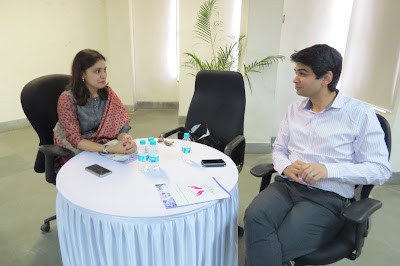Looking at the gravity of the situation at hand and the weight of the responsibility being shouldered by BJS, a Department of Mental Health has been set up at WERC with Dr. Ashutosh Chauhan as the Head of the Dept and Dr. Kinjal Goyal (Mental Health Consultant-BJS). After a series of visits to WERC and interactions with the stakeholders and the students by Dr. Chauhan, Dr. Kinjal and Mr. Shantilal Muttha, (Founder, BJS), an MoU was signed between BJS, Meadowlark Healthcare Pvt. Ltd. and Dr. Kinjal Goyal on 29th January 2016 to formalize this association. Together they would roll out diagnostic, preventive and therapeutic interventions for the children at WERC. Dr. Ashutosh Chauhan would offer his professional services with his team of three consultant clinical psychologists at Meadowlark Healthcare.
Dr. Ashutosh Chauhan (MD, Psychiatry)
is one of the leading psychiatrists in Pune. His areas of interest include
Neuropsychiatry and Neuro-developmental/ Child Psychiatry. He has scores of
publications and research papers to his credit, which he has presented at
several national and international forums, this includes several research
papers and dissertation in the field of Suicidology. Several awards have been
conferred upon him with for his stellar achievements and contribution in the
field of psychiatry. He has been often invited as a speaker in various national
and international conferences and
symposia, such as the Royal College of Psychiatrists at London, Japanese
Society of Psychiatrists and Neurologists, Japan. He was selected for the
world psychiatrists' association’s young fellowship program to represent Indian
Subcontinent and was later selected by AMH (an organization started by Prof.
Norman Sartorius) to represent India for the Leadership course for Young
psychiatrists at Singapore. Dr. Chauhan is associated with several
leading hospitals in the city and is heading mental health
services at Meadowlark Healthcare, an organization with
fully equipped specialty and super- specialty polyclinics and
comprehensive diagnostic facility across two locations of Fatima Nagar and
Shivajinagar in Pune.
Dr. Kinjal Goyal (Ph.D. (Health
Psychology)), is a practising psychotherapist and Psychosomatic Counselling and
the use of Cognitive Behavioural Therapy (CBT) in the treatment of various
psychological and physical issues is her forte. She has completed Basic and
Advanced Labs in Human Processes with the Indian Society for Applied
Behavioural Sciences and has completed certificate courses in Psychopharmacology, CBT and Treatments
that work with Children from the American Psychological Association. She has
worked in the field of online psychotherapy for many years with a client base
spanning over 9 countries. She has conducted various workshops for adolescents
and parents in various schools in Pune.
She has authored publications
such as a self help book titled Musings
of a Shrink and also has a creative
piece Ashes off the Embers to her credit.
Interventions by Meadowlark Healthcare
As a part of
the diagnostic screening, Meadowlark Healthcare has identified CPMS (Childhood
Psychopathology Measurement Schedule) as a sensitive screening tool, which
has already been validated in the Indian context. It is easy to use and is
intended to yield best results for this population. (CPMS is standardized on
Indian population and is applicable to children of both sexes in the age range
of 4-14 years. It measures overall psychopathology in the form of total scores
and also the type of psychopathology in the form of eight factorially derived
syndromes which have satisfactory reliability and validity. CPMS is proposed to
be used as a screening instrument in population surveys to identify disturbed
children as well as a research tool involving measurement of childhood
psychopathology and its classification.)
With the need
to have a care-model which not only takes care of intervention, but also of the
prevention aspect, Meadowlark Healthcare would interact with WERC teachers (both
hostel and school teachers) and care-givers on an on-going basis. This would be
initiated through an interactive workshop for the staff at WERC, primarily with
the following objectives:
-to enable them
to understand the difference between
normal behavioural changes and pathological behaviour, or a pattern that is a
deviation from what is considered as normal;
-to acquaint
them with the screening tool, to understand the implication of each item on
this tool and to enable them to administer the same properly, in the desired
time frame and record the results appropriately.
Based on the
results of the screening performed by the teachers, Meadowlark Healthcare would
formulate a combination of non-pharmacological and pharmacological treatment
plan as per the gravity of the problem diagnosed. The screening results would
be used to categorize the students according to the intensity of treatment
required.




